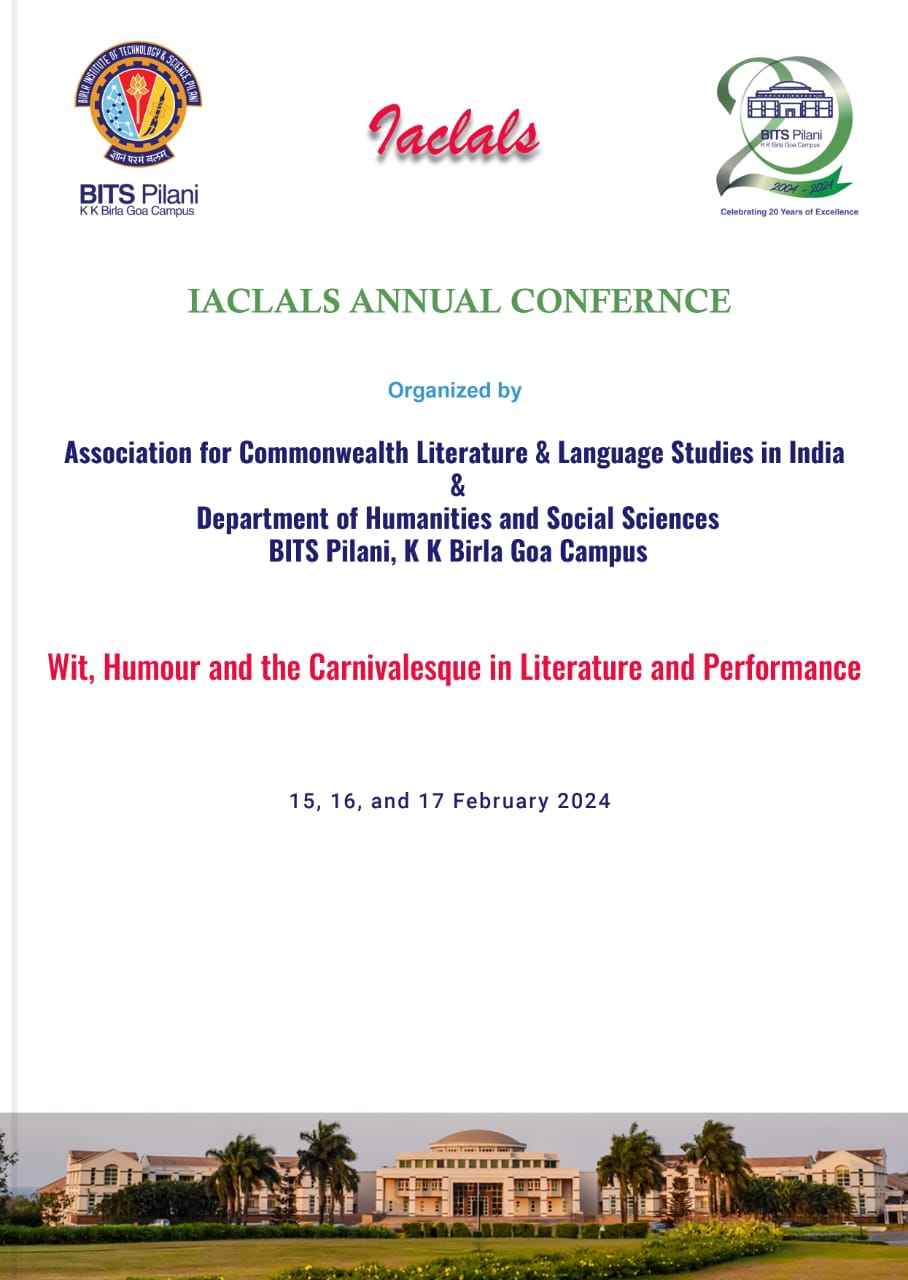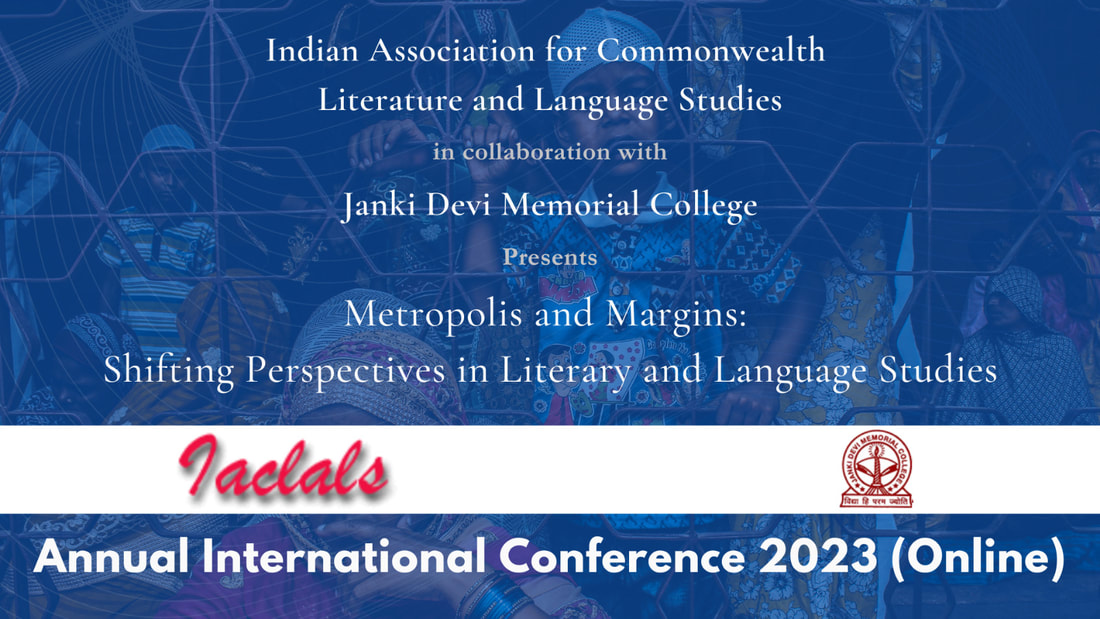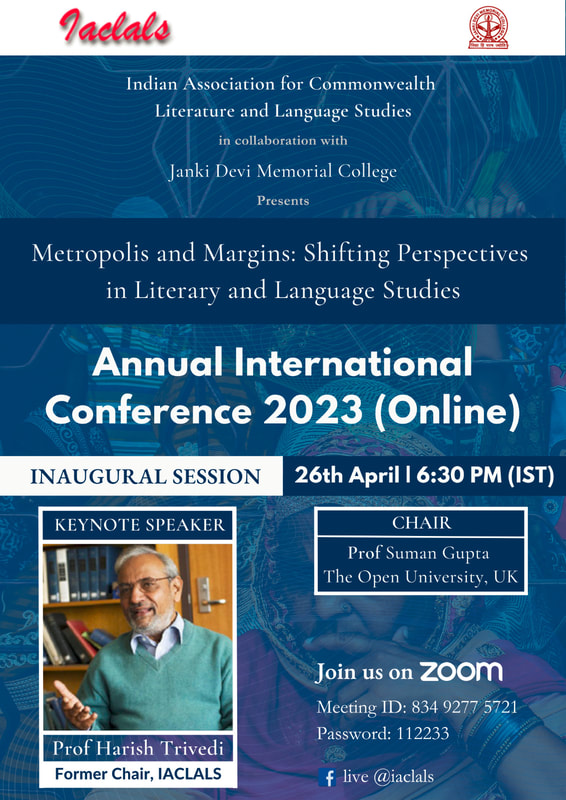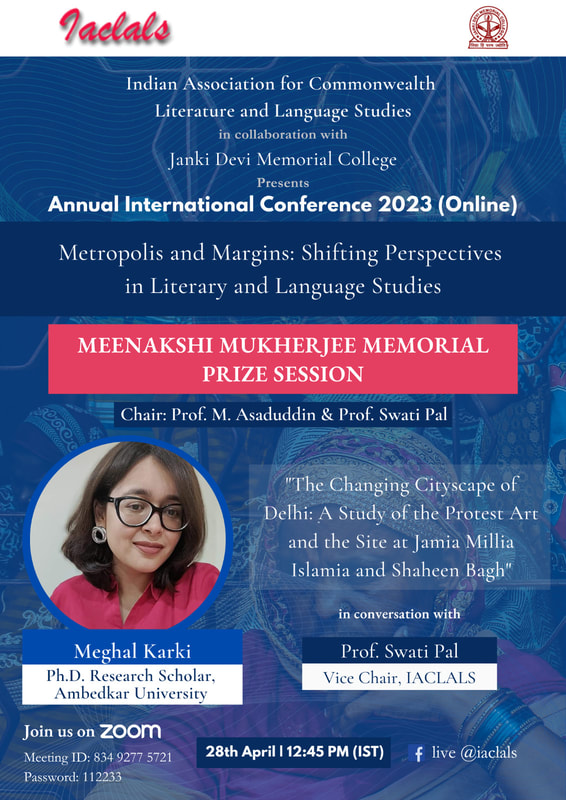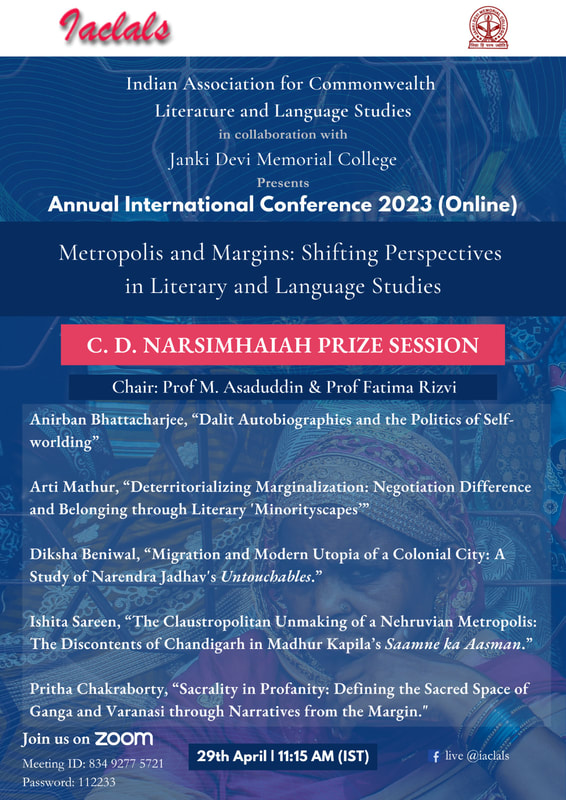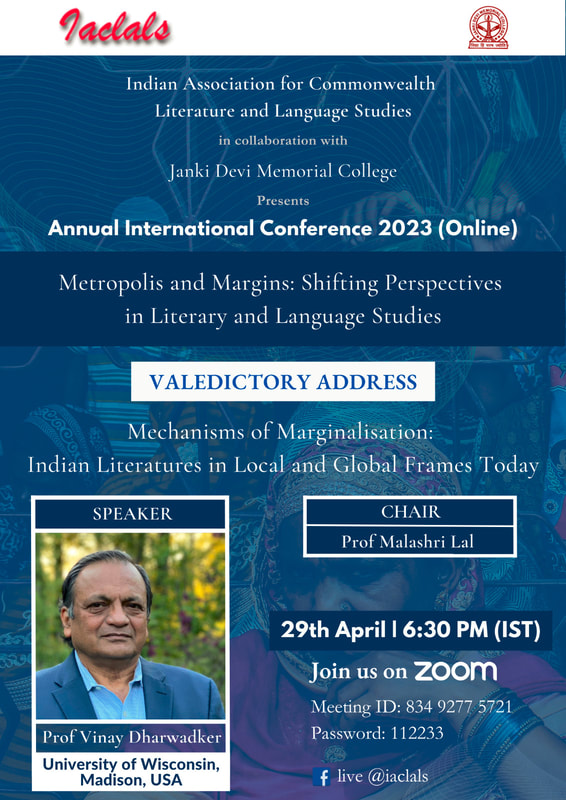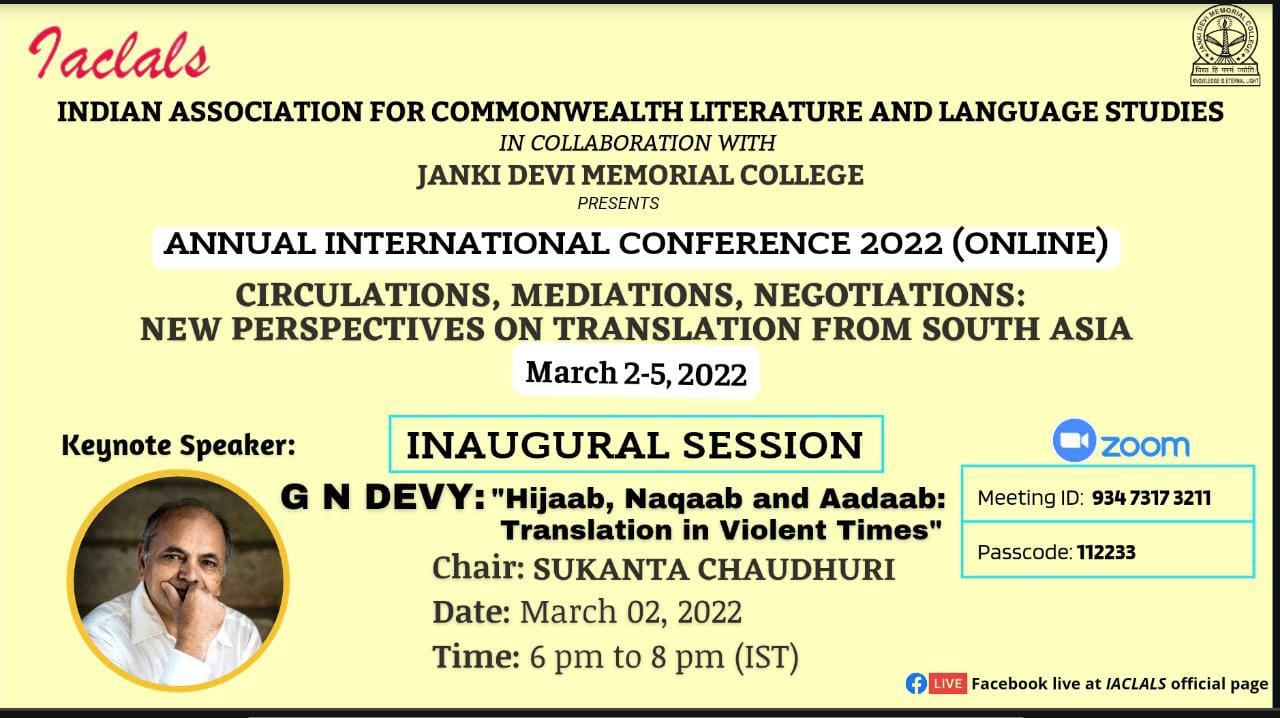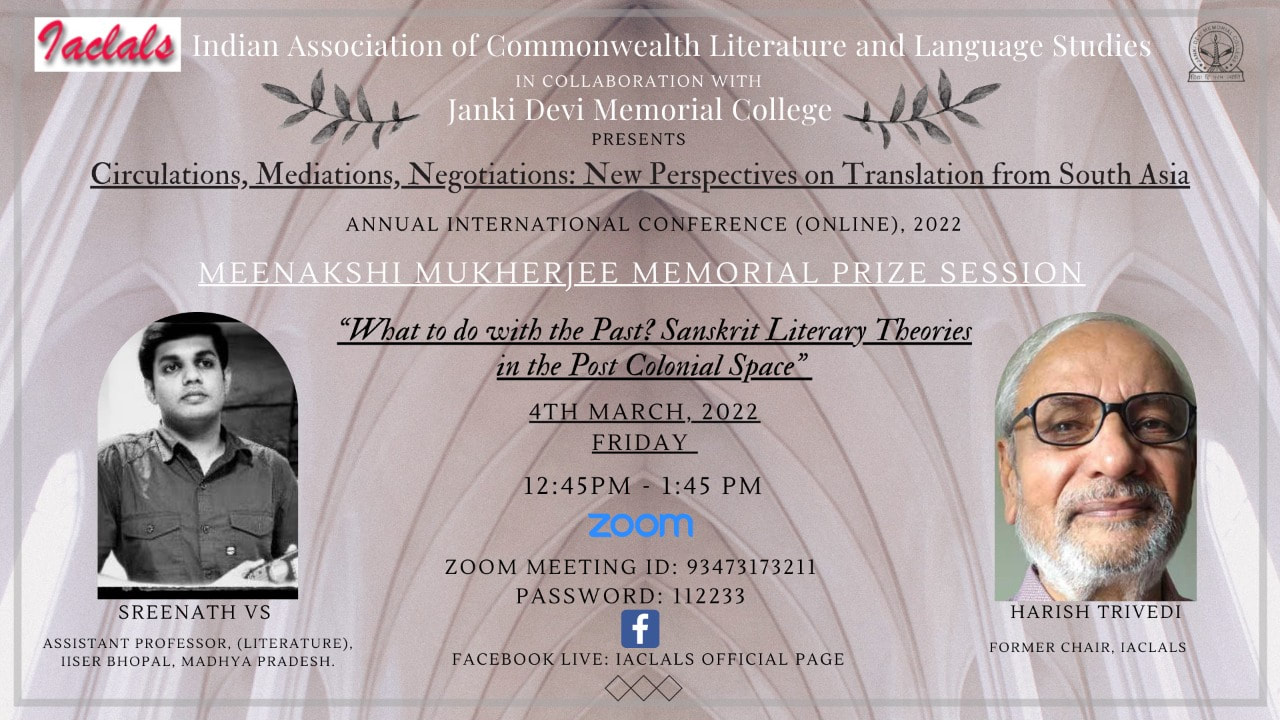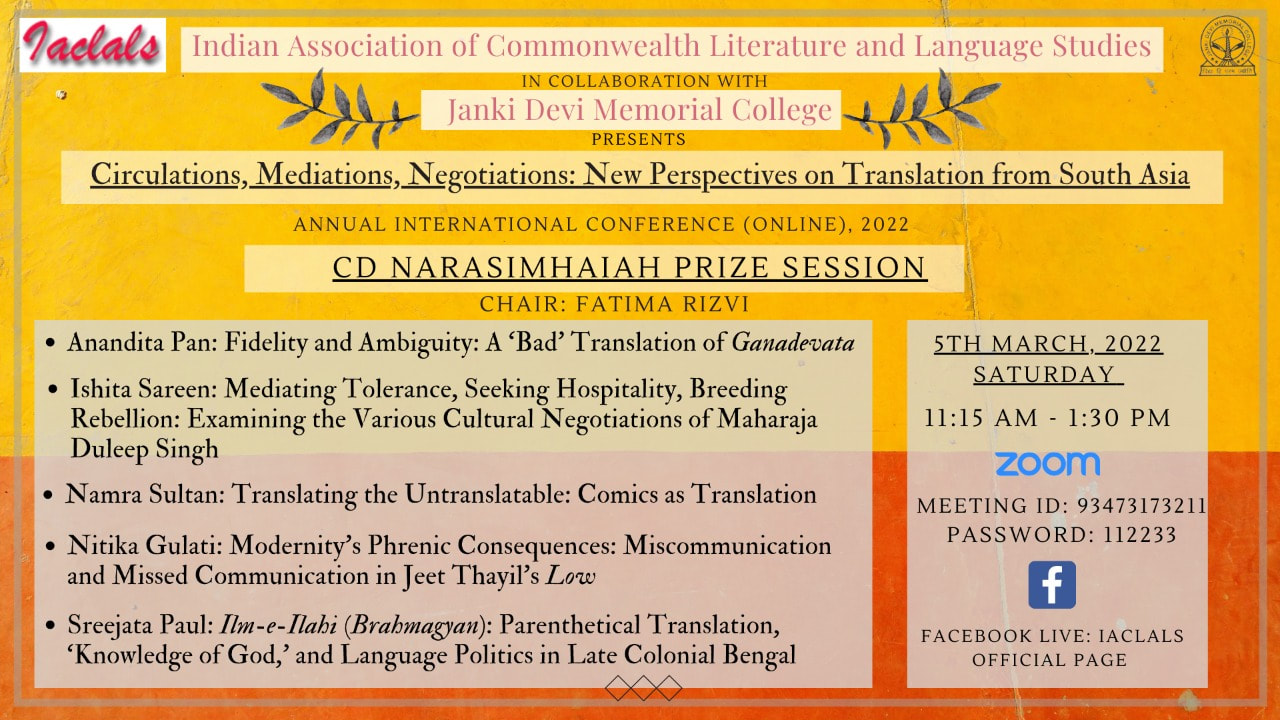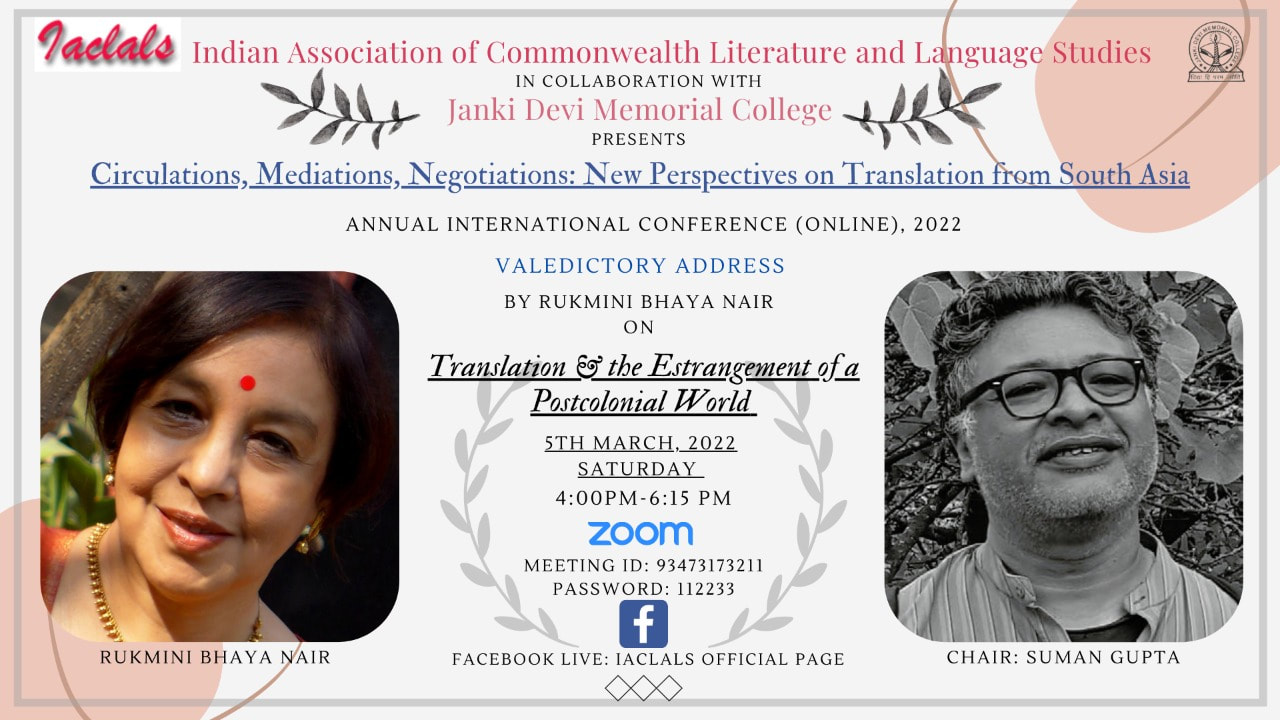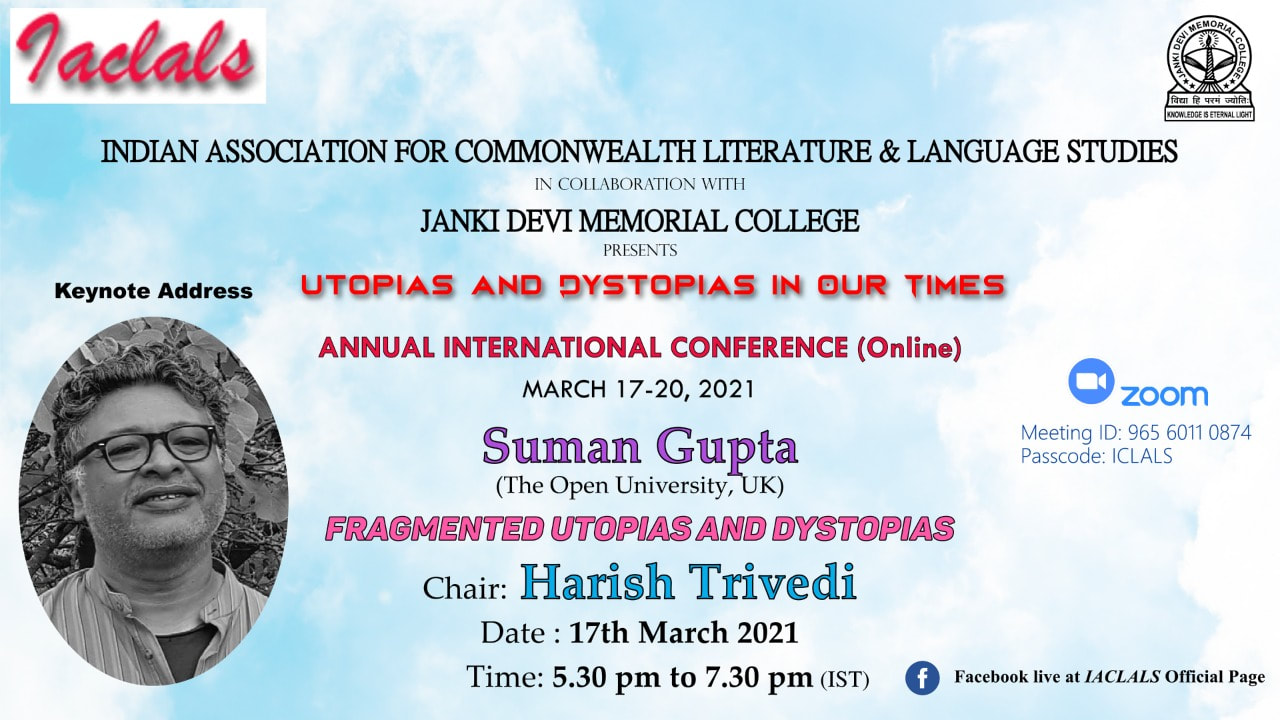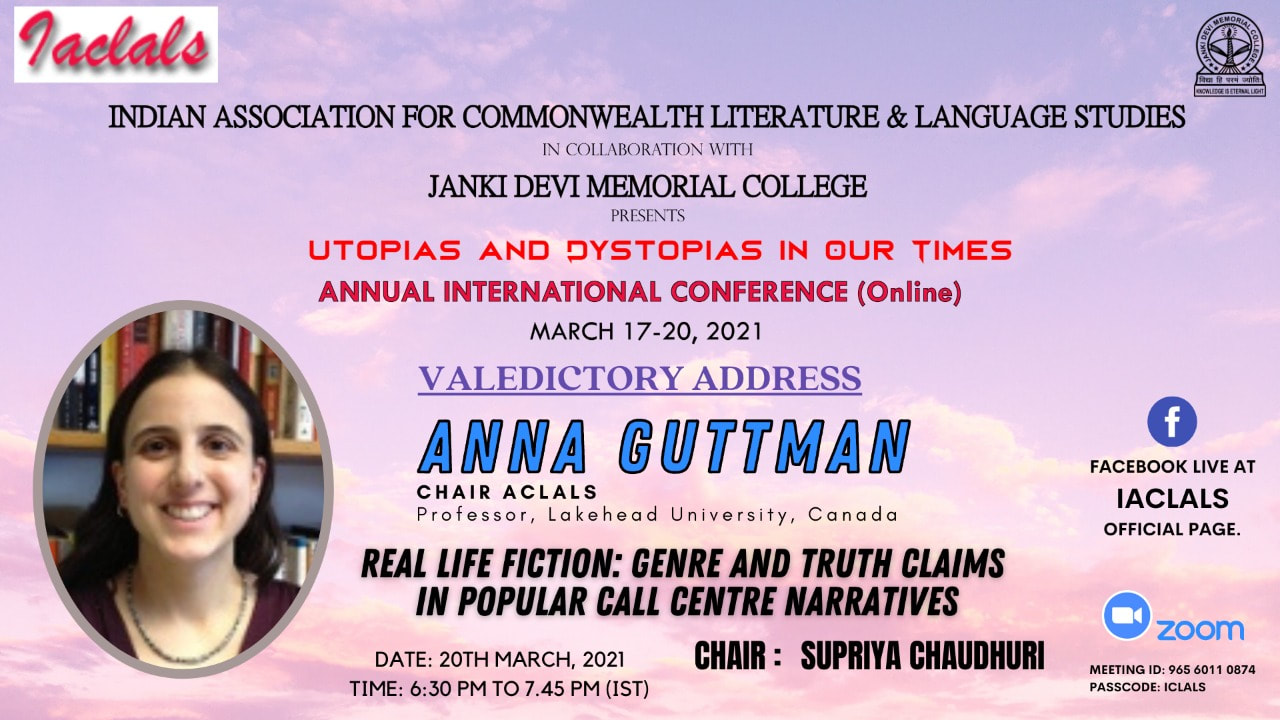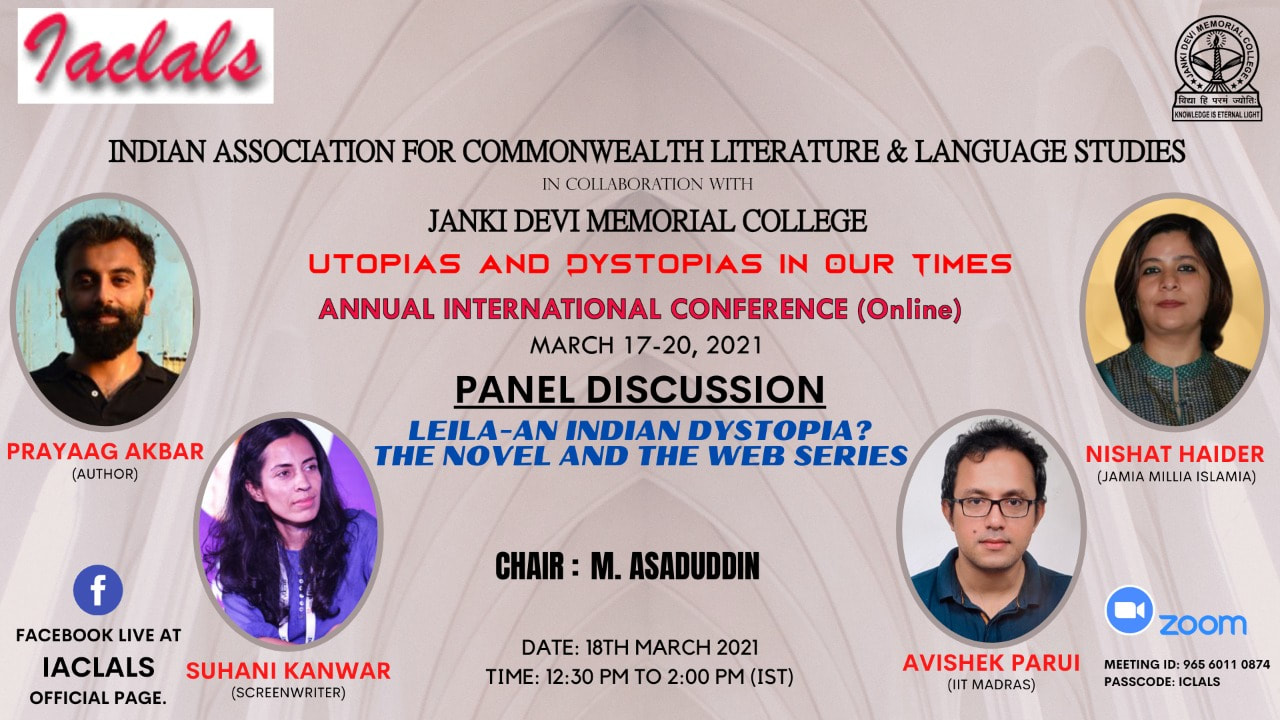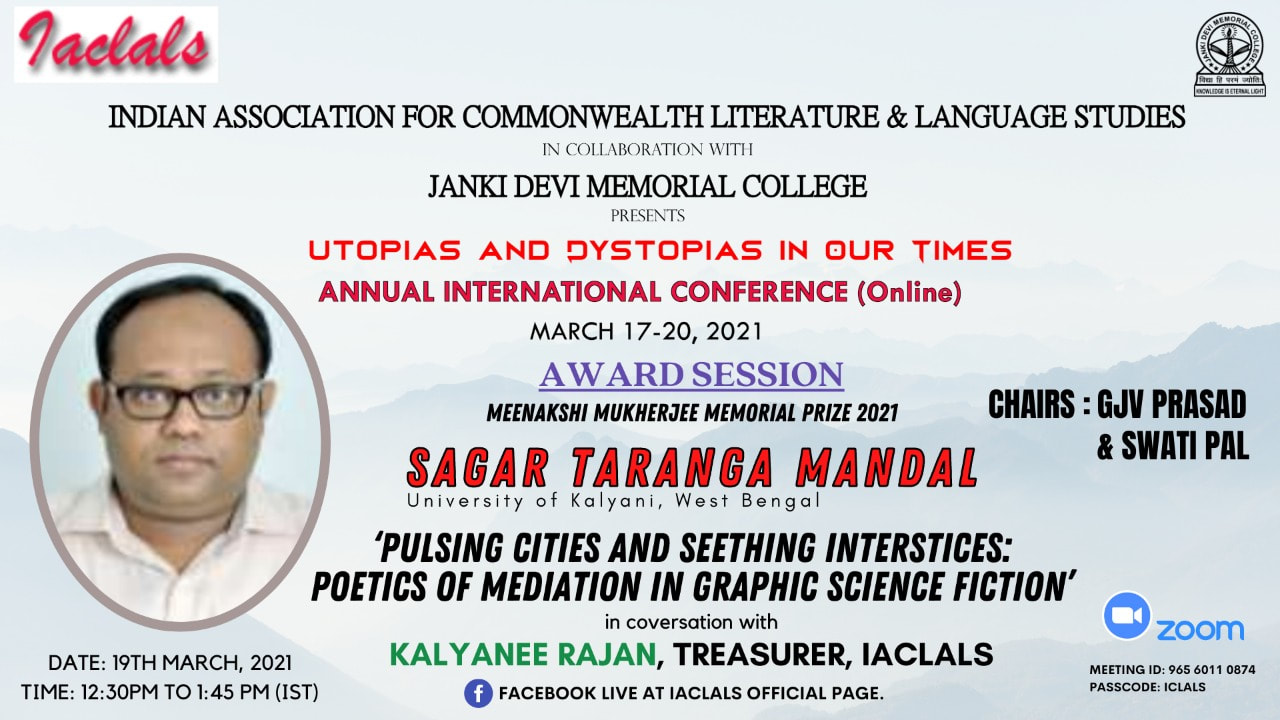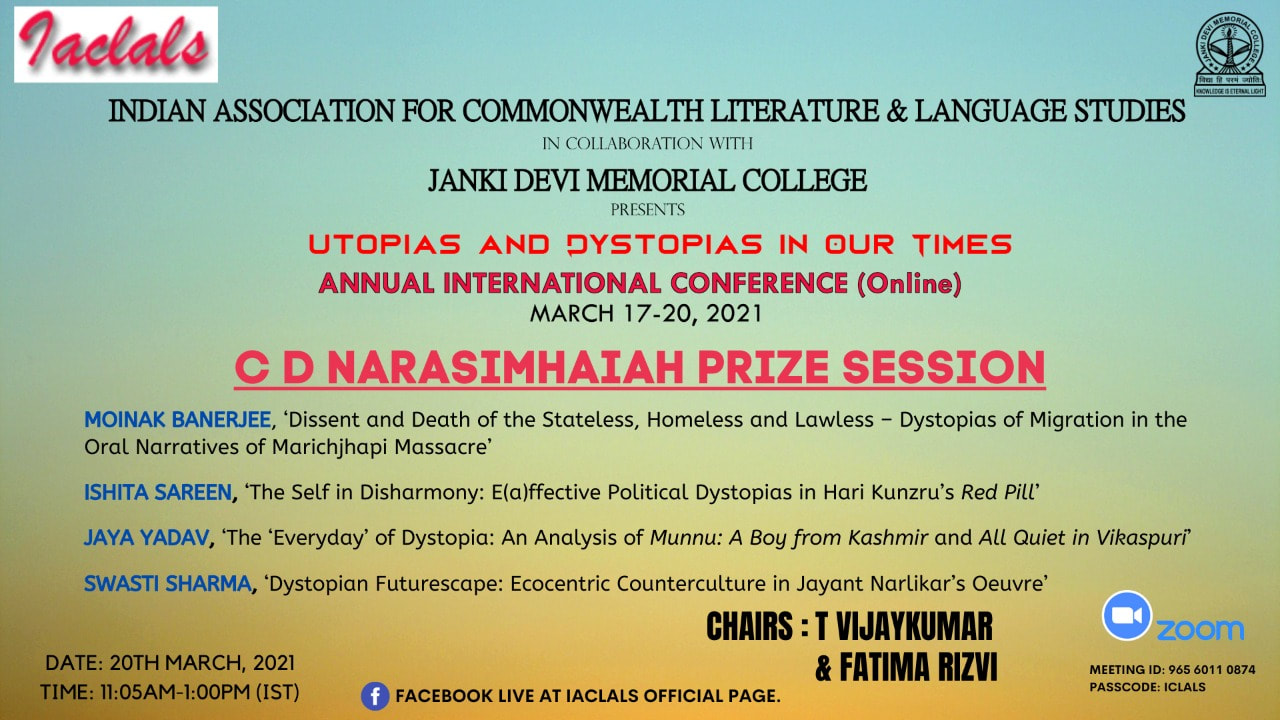𝗜𝗔𝗖𝗟𝗔𝗟𝗦 𝗔𝗻𝗻𝘂𝗮𝗹 𝗖𝗼𝗻𝗳𝗲𝗿𝗲𝗻𝗰𝗲 (Offline) 2024
Wit, Humour, and the Carnivalesque in Literature and Performance
15-16-17 February 2024
Department of Humanities and Social Sciences, BITS Pilani, K.K. Birla Goa Campus
FINAL CONFERENCE SCHEDULE: conference_programme.pdf
15-16-17 February 2024
Department of Humanities and Social Sciences, BITS Pilani, K.K. Birla Goa Campus
FINAL CONFERENCE SCHEDULE: conference_programme.pdf
CFP: 𝗜𝗔𝗖𝗟𝗔𝗟𝗦 𝗔𝗻𝗻𝘂𝗮𝗹 𝗖𝗼𝗻𝗳𝗲𝗿𝗲𝗻𝗰𝗲 (Off𝗹𝗶𝗻𝗲) 2024
IACLALS
(Association for Commonwealth Literature and Language Studies in India)
Annual International Conference 2024
co-hosted by
Department of Humanities and Social Sciences, BITS Pilani, K.K. Birla Goa Campus
on
Wit, Humour, and the Carnivalesque in Literature and Performance
15-17 February, 2024
Wit, humour and the carnivalesque cover a wide spectrum of literary expressions and have remained integral elements of World Literature, from the classical to the modern age. From providing pure delight and entertainment and social criticism to drawing attention to the fundamental incongruities and iniquities of life, writers have deployed wit and humour to great effects. From Aristophanes, Cervantes, Rabelais, Mark Twain to P.G. Woodhouse, from Sukumar Roy, Vaikom Muhammad Basheer to Harishankar Parsai, to take some random examples from literature alone, we will see the extraordinary range and scope of the comic imagination these writers possessed and to what effects they used them. It is extraordinary to witness how wit and humour have seamlessly been incorporated as elements of narrative, characterisation, amplification and subversion, within the accepted conventions of various literary genres. Literature and performance can be analysed to explore the role of humour and wit in bringing about positive changes in the society, and also how oral and body-centric dimensions of the carnivalesque get reflected in ritual-based performances. By means of seemingly innocuous subjects and styles of presentation, they actually end up challenging oppressive social hierarchy and empower marginal voices, leading towards the concept of a more egalitarian, equitable and just society. Humour can be both resistance and liberation. It is also an extraordinary tool of coping mechanism in different situations of life where immediate redress is unavailable. The liberating potential of wit and humour and the carnivalesque, particularly in the Indian context, has remained understudied. We have a rich treasure-trove of literature in the comic vein in different Indian languages but relatively few critical studies on it/them. The IACLALS Conference 2024 is intended to explore this relatively less-studied field of literature and performance in the Indian and the global contexts in these times.
If we trace the history of classical Greek and Latin comedies, we find that they dramatized contemporary history and the quotidian. The protagonists were citizens of Rome and Athens from across classes, be they the nobility or slaves or criminals or householders. Humour was topical and relatable while satire/lampoon was critical and brutal. It was feared for good reason as it could be savage and unsparing. It was a means to expose the follies of people and hold a mirror to the audience about the contemporary society. The plays of Shakespeare (more specifically, Shakespearean comedies) or Strindberg perform the same function. Some of the most powerful examples of satire in English are Jonathan Swift’s A Modest Proposal and John Dryden’s Mac Flecknoe. It will also be interesting to explore how wit and humour interfaces with the art of rhetoric. In the light of the literary works of Rabelais and Dostoevsky, it is also pertinent to understand in what way rhetorical devices make selective application of the transformative/subversive power of the carnivalesque to sound persuasive.
Modern day comedy often chooses to enter our lives through political caricature. The British Punch magazine (and its multiple Indian avatars) is of course one of the best examples to show how various subjects could be ridiculed through caricature , drawing laughter as well as providing political commentary. In English writing in India, one sees political caricature happening in newspapers and magazines where political cartoons were carried in some of the earliest ones. However, it is also claimed that the Vidusaka or the comic figure in Sanskrit drama, was the predecessor to the political cartoonist and that such drama in the Indian satirical tradition commented on the nature as well as purpose of wit and humour in drama. Indeed, wit and humour in their myriad forms are intrinsic to folk forms, literary works, theatre, performance, television, cinema, stand-up, comics and cartoons. The conference will provide an excellent opportunity to explore continuities and ruptures in both local and global literary traditions.Finally, the notion of the carnivalesque has close associations with the idea of the “place”— how certain sites around the world like Goa and Rio are associated with the subjective possibilities of relaxation and withdrawal of order.We intend to explore how the concept of the "carnivalesque" can be invested with therapeutic/recuperative significance.
Papers are invited on the following sub-themes:
GUIDELINES
The conference is open 𝒐𝒏𝒍𝒚 𝒕𝒐 𝒎𝒆𝒎𝒃𝒆𝒓𝒔 𝒐𝒇𝑰𝑨𝑪𝑳𝑨𝑳𝑺. All participants are encouraged to avail of membership before sending abstracts for the conference.
(Please visit https://www.iaclals.com/membership.html to know how to become a member.)
Abstracts of 300 words with a bio-note of no more than 50 words may be submitted to [email protected] by October 20, 2023.
CDN PRIZE 2024:
If you wish to participate in the C. D. Narasimhaiah Prize for the Best Paper Presented at an Annual Conference, kindly indicate “Submission for CDN Prize” in the subject line of the email, when you send in your full papers to [email protected] (the last date for submission of complete papers is November 30, 2023). For more details about the CDN Prize, visit: https://www.iaclals.com/cdn-prize.html
MMM PRIZE 2024:
IACLALS also announces the next edition of the Meenakshi Mukherjee Memorial Prize for the Best Academic Paper published by a member during the previous block of two years, 2022& 2023. In accordance with the detailed MMM Prize submission guidelines available on the website page listed below, IACLALS Members can submit their published paper for consideration to [email protected] latest by October 15, 2023. The Author(s) should have been a member of IACLALS at the time of publication of the paper. Please be sure to indicate “Submission for MMM Prize 2024” in the subject line of the email. For detailed MMM Prize submission guidelines, do visit: https://www.iaclals.com/mmm-prize.html
Registration Fee and Mode of Payment (for Registration as well as Membership)
Sent to selected participants individually.
Accommodation
Participants will make arrangements for their own stay. The conference organizers will suggest a list of nearby hotels/guest houses/ home stays at a later date.
About Birla Institute of Technology and Science, Pilani
The Birla Institute of Technology and Science (BITS), Pilani, established in the year 1964, is an all-India Institute for Higher Education deemed to be a university by the Government of India. BITS offers admission in three tiers: First Degree, Higher Degree and Doctoral Degree. Programmes are offered in various disciplines such as Engineering, Science, Management and Humanities. BITS has always been ranked as one of the top few educational institutions of its kind. The university has five campuses in Pilani (Rajasthan), Goa, Hyderabad (Telangana), Mumbai (Maharashtra) and Dubai (UAE).
The Department of Humanities and Social Sciences at the BITS Pilani, K.K. Birla Goa Campus offers various courses in the areas of English language and Literature, Professional Communication, Mass Media, Philosophy, Political Science, Ecocriticism, Sociology and Developmental Studies. The department aims at enriching the knowledge and awareness of students in various areas of humanistic and social studies and enhancing the life-quality of all living beings.
For more details about the department, please check:
https://www.bits-pilani.ac.in/goa/HumanitiesandSocialSciences/HumanitiesandSocialSciences
(Association for Commonwealth Literature and Language Studies in India)
Annual International Conference 2024
co-hosted by
Department of Humanities and Social Sciences, BITS Pilani, K.K. Birla Goa Campus
on
Wit, Humour, and the Carnivalesque in Literature and Performance
15-17 February, 2024
Wit, humour and the carnivalesque cover a wide spectrum of literary expressions and have remained integral elements of World Literature, from the classical to the modern age. From providing pure delight and entertainment and social criticism to drawing attention to the fundamental incongruities and iniquities of life, writers have deployed wit and humour to great effects. From Aristophanes, Cervantes, Rabelais, Mark Twain to P.G. Woodhouse, from Sukumar Roy, Vaikom Muhammad Basheer to Harishankar Parsai, to take some random examples from literature alone, we will see the extraordinary range and scope of the comic imagination these writers possessed and to what effects they used them. It is extraordinary to witness how wit and humour have seamlessly been incorporated as elements of narrative, characterisation, amplification and subversion, within the accepted conventions of various literary genres. Literature and performance can be analysed to explore the role of humour and wit in bringing about positive changes in the society, and also how oral and body-centric dimensions of the carnivalesque get reflected in ritual-based performances. By means of seemingly innocuous subjects and styles of presentation, they actually end up challenging oppressive social hierarchy and empower marginal voices, leading towards the concept of a more egalitarian, equitable and just society. Humour can be both resistance and liberation. It is also an extraordinary tool of coping mechanism in different situations of life where immediate redress is unavailable. The liberating potential of wit and humour and the carnivalesque, particularly in the Indian context, has remained understudied. We have a rich treasure-trove of literature in the comic vein in different Indian languages but relatively few critical studies on it/them. The IACLALS Conference 2024 is intended to explore this relatively less-studied field of literature and performance in the Indian and the global contexts in these times.
If we trace the history of classical Greek and Latin comedies, we find that they dramatized contemporary history and the quotidian. The protagonists were citizens of Rome and Athens from across classes, be they the nobility or slaves or criminals or householders. Humour was topical and relatable while satire/lampoon was critical and brutal. It was feared for good reason as it could be savage and unsparing. It was a means to expose the follies of people and hold a mirror to the audience about the contemporary society. The plays of Shakespeare (more specifically, Shakespearean comedies) or Strindberg perform the same function. Some of the most powerful examples of satire in English are Jonathan Swift’s A Modest Proposal and John Dryden’s Mac Flecknoe. It will also be interesting to explore how wit and humour interfaces with the art of rhetoric. In the light of the literary works of Rabelais and Dostoevsky, it is also pertinent to understand in what way rhetorical devices make selective application of the transformative/subversive power of the carnivalesque to sound persuasive.
Modern day comedy often chooses to enter our lives through political caricature. The British Punch magazine (and its multiple Indian avatars) is of course one of the best examples to show how various subjects could be ridiculed through caricature , drawing laughter as well as providing political commentary. In English writing in India, one sees political caricature happening in newspapers and magazines where political cartoons were carried in some of the earliest ones. However, it is also claimed that the Vidusaka or the comic figure in Sanskrit drama, was the predecessor to the political cartoonist and that such drama in the Indian satirical tradition commented on the nature as well as purpose of wit and humour in drama. Indeed, wit and humour in their myriad forms are intrinsic to folk forms, literary works, theatre, performance, television, cinema, stand-up, comics and cartoons. The conference will provide an excellent opportunity to explore continuities and ruptures in both local and global literary traditions.Finally, the notion of the carnivalesque has close associations with the idea of the “place”— how certain sites around the world like Goa and Rio are associated with the subjective possibilities of relaxation and withdrawal of order.We intend to explore how the concept of the "carnivalesque" can be invested with therapeutic/recuperative significance.
Papers are invited on the following sub-themes:
- Wit and humour in classical comedy
- Wit and humour and the carnivalesque
- Wit and humour and Resistance
- Wit and humour as Parody/Pastiche
- Wit and humour and stand-up comedy
- Black humour
- The comic imagination and literatures for children and young adults
- The comic imagination and graphic novels
- Wit and humour in Sanskrit Poetics
- Wit and humour in Sangam Literature
- Wit and humour in Indigenous literature(s)
- Wit and humour and Folklore
- Wit and humour in visual arts
- Wit and humour and caricature
- Parody and satire, pathos and bathos
- Wit and humour and gender
- Wit and humour and catharsis
- Wit and humour and ethnicity and race
GUIDELINES
The conference is open 𝒐𝒏𝒍𝒚 𝒕𝒐 𝒎𝒆𝒎𝒃𝒆𝒓𝒔 𝒐𝒇𝑰𝑨𝑪𝑳𝑨𝑳𝑺. All participants are encouraged to avail of membership before sending abstracts for the conference.
(Please visit https://www.iaclals.com/membership.html to know how to become a member.)
Abstracts of 300 words with a bio-note of no more than 50 words may be submitted to [email protected] by October 20, 2023.
CDN PRIZE 2024:
If you wish to participate in the C. D. Narasimhaiah Prize for the Best Paper Presented at an Annual Conference, kindly indicate “Submission for CDN Prize” in the subject line of the email, when you send in your full papers to [email protected] (the last date for submission of complete papers is November 30, 2023). For more details about the CDN Prize, visit: https://www.iaclals.com/cdn-prize.html
MMM PRIZE 2024:
IACLALS also announces the next edition of the Meenakshi Mukherjee Memorial Prize for the Best Academic Paper published by a member during the previous block of two years, 2022& 2023. In accordance with the detailed MMM Prize submission guidelines available on the website page listed below, IACLALS Members can submit their published paper for consideration to [email protected] latest by October 15, 2023. The Author(s) should have been a member of IACLALS at the time of publication of the paper. Please be sure to indicate “Submission for MMM Prize 2024” in the subject line of the email. For detailed MMM Prize submission guidelines, do visit: https://www.iaclals.com/mmm-prize.html
Registration Fee and Mode of Payment (for Registration as well as Membership)
Sent to selected participants individually.
Accommodation
Participants will make arrangements for their own stay. The conference organizers will suggest a list of nearby hotels/guest houses/ home stays at a later date.
About Birla Institute of Technology and Science, Pilani
The Birla Institute of Technology and Science (BITS), Pilani, established in the year 1964, is an all-India Institute for Higher Education deemed to be a university by the Government of India. BITS offers admission in three tiers: First Degree, Higher Degree and Doctoral Degree. Programmes are offered in various disciplines such as Engineering, Science, Management and Humanities. BITS has always been ranked as one of the top few educational institutions of its kind. The university has five campuses in Pilani (Rajasthan), Goa, Hyderabad (Telangana), Mumbai (Maharashtra) and Dubai (UAE).
The Department of Humanities and Social Sciences at the BITS Pilani, K.K. Birla Goa Campus offers various courses in the areas of English language and Literature, Professional Communication, Mass Media, Philosophy, Political Science, Ecocriticism, Sociology and Developmental Studies. The department aims at enriching the knowledge and awareness of students in various areas of humanistic and social studies and enhancing the life-quality of all living beings.
For more details about the department, please check:
https://www.bits-pilani.ac.in/goa/HumanitiesandSocialSciences/HumanitiesandSocialSciences
𝗜𝗔𝗖𝗟𝗔𝗟𝗦 𝗔𝗻𝗻𝘂𝗮𝗹 𝗜𝗻𝘁𝗲𝗿𝗻𝗮𝘁𝗶𝗼𝗻𝗮𝗹 𝗖𝗼𝗻𝗳𝗲𝗿𝗲𝗻𝗰𝗲 (O𝗻𝗹𝗶𝗻𝗲) 2023
INDIAN ASSOCIATION FOR COMMONWEALTH LITERATURE & LANGUAGE STUDIES (IACLALS)
in collaboration with
JANKI DEVI MEMORIAL COLLEGE, UNIVERSITY OF DELHI
ANNUAL CONFERENCE 2023 (ONLINE)
on
Metropolis and Margins: Shifting Configurations in Literature and Language Studies
April 26-29, 2023
Conference Schedule:
2023_schedule--_𝗜𝗔𝗖𝗟𝗔𝗟𝗦_𝗔𝗻𝗻𝘂𝗮𝗹_𝗜𝗻𝘁𝗲𝗿𝗻𝗮𝘁𝗶𝗼𝗻𝗮𝗹_𝗖𝗼𝗻𝗳𝗲𝗿𝗲𝗻𝗰𝗲__𝗼𝗻𝗹𝗶𝗻𝗲__-_google_docs.pdf
Book of Abstracts:
iaclals_conference_2023_book_of_abstracts___bionotes.pdf
Facebook Live Stream:
IACLALS Official Page
IACLALS Here FB Account
in collaboration with
JANKI DEVI MEMORIAL COLLEGE, UNIVERSITY OF DELHI
ANNUAL CONFERENCE 2023 (ONLINE)
on
Metropolis and Margins: Shifting Configurations in Literature and Language Studies
April 26-29, 2023
Conference Schedule:
2023_schedule--_𝗜𝗔𝗖𝗟𝗔𝗟𝗦_𝗔𝗻𝗻𝘂𝗮𝗹_𝗜𝗻𝘁𝗲𝗿𝗻𝗮𝘁𝗶𝗼𝗻𝗮𝗹_𝗖𝗼𝗻𝗳𝗲𝗿𝗲𝗻𝗰𝗲__𝗼𝗻𝗹𝗶𝗻𝗲__-_google_docs.pdf
Book of Abstracts:
iaclals_conference_2023_book_of_abstracts___bionotes.pdf
Facebook Live Stream:
IACLALS Official Page
IACLALS Here FB Account
𝗜𝗔𝗖𝗟𝗔𝗟𝗦 𝗔𝗻𝗻𝘂𝗮𝗹 𝗜𝗻𝘁𝗲𝗿𝗻𝗮𝘁𝗶𝗼𝗻𝗮𝗹 𝗖𝗼𝗻𝗳𝗲𝗿𝗲𝗻𝗰𝗲 (𝗼𝗻𝗹𝗶𝗻𝗲) 2022
INDIAN ASSOCIATION FOR COMMONWEALTH LITERATURE AND LANGUAGE STUDIES (IACLALS)
in collaboration with
JANKI DEVI MEMORIAL COLLEGE, UNIVERSITY OF DELHI
ANNUAL INTERNATIONAL CONFERENCE 2022 (Online)
on
CIRCULATIONS, MEDIATIONS, NEGOTIATIONS: NEW PERSPECTIVES ON TRANSLATION FROM SOUTH ASIA
MARCH 2-5, 2022
Keynote Address: MARCH 2, 2022
Conference Schedule: iaclals___jdmc-2022-_online_conference_schedule.pdf
Abstracts Booklet: iaclals_2022_book_of_abstracts.pdf
ALL SESSIONS STREAMED LIVE ON OUR FACEBOOK PAGE.
in collaboration with
JANKI DEVI MEMORIAL COLLEGE, UNIVERSITY OF DELHI
ANNUAL INTERNATIONAL CONFERENCE 2022 (Online)
on
CIRCULATIONS, MEDIATIONS, NEGOTIATIONS: NEW PERSPECTIVES ON TRANSLATION FROM SOUTH ASIA
MARCH 2-5, 2022
Keynote Address: MARCH 2, 2022
Conference Schedule: iaclals___jdmc-2022-_online_conference_schedule.pdf
Abstracts Booklet: iaclals_2022_book_of_abstracts.pdf
ALL SESSIONS STREAMED LIVE ON OUR FACEBOOK PAGE.
IACLALS ANNUAL INTERNATIONAL CONFERENCE 2021
INDIAN ASSOCIATION FOR COMMONWEALTH LITERATURE AND LANGUAGE STUDIES (IACLALS)
in collaboration with
JANKI DEVI MEMORIAL COLLEGE, UNIVERSITY OF DELHI
ANNUAL INTERNATIONAL CONFERENCE 2021 (Online)
on
UTOPIAS AND DYSTOPIAS IN OUR TIMES
MARCH 18-20, 2021
Keynote Address: MARCH 17, 2021
Conference Schedule: iaclals_2021_annual_international_conference_schedule.pdf
Abstracts Booklet: iaclals_2021_annual_conference_abstracts_booklet.pdf
All sessions are available to view on our Facebook Page.
in collaboration with
JANKI DEVI MEMORIAL COLLEGE, UNIVERSITY OF DELHI
ANNUAL INTERNATIONAL CONFERENCE 2021 (Online)
on
UTOPIAS AND DYSTOPIAS IN OUR TIMES
MARCH 18-20, 2021
Keynote Address: MARCH 17, 2021
Conference Schedule: iaclals_2021_annual_international_conference_schedule.pdf
Abstracts Booklet: iaclals_2021_annual_conference_abstracts_booklet.pdf
All sessions are available to view on our Facebook Page.

